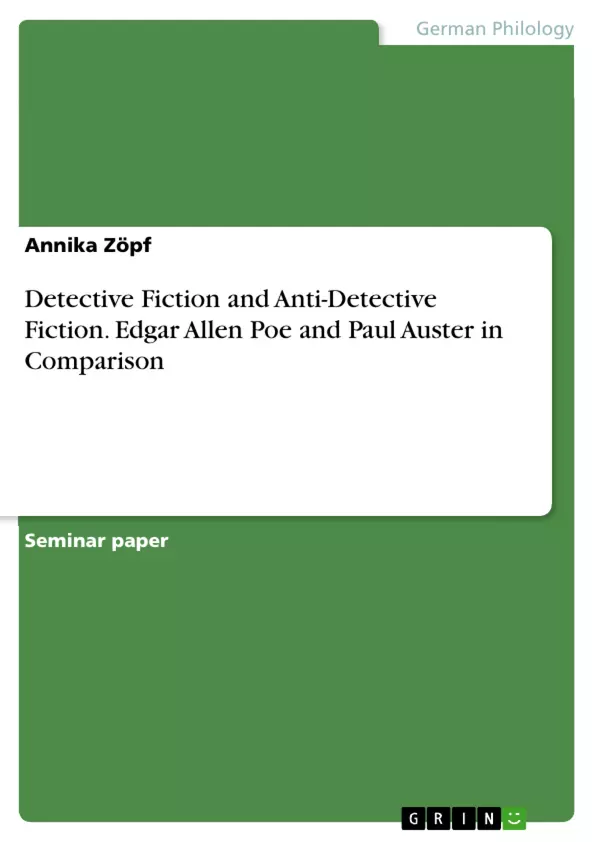In a preface to his books on crime fiction Stephen Knight says, “No detective is needed to identify the vigorous life and remarkable diversity of crime fiction”. This statement is certainly true. The pool of crime fiction literature, readers of the twenty-first century can choose from, is huge. Statistics show that, “In 2017, crime became the UK’s most popular adult fiction genre, outselling general and literary fiction for the first time”. To narrow this abundance of information down by a good chunk this paper only focuses of detective fiction, a sub-genre of crime fiction. More specifically, it takes a look at the works of two authors. One of these authors is Edgar Allan Poe who is often deemed the father of the detective genre, a claim that will be investigated later on in this paper. His influence on detective fiction can be traced throughout the centuries but is particularly strong in Paul Auster. Auster in turn epitomizes postmodern detective fiction, also called anti-detective fiction, which is a sub-genre of traditional detective fiction. He is the second author chosen here. The goal of this paper is to determine why postmodern detective fiction is considered a sub-genre of traditional detective fiction, shining light on what sets it apart from the traditional detective fiction.
Table of Contents
- Introduction
- Defining Detective Fiction
- Key Stages in the History of Detective Fiction
- Origins of Detective Fiction
- Development of Detective Fiction
- Postmodern Detective Fiction
- Comparing Detective Texts - The Purloined Letter by E. A. Poe and City of Glass by Paul Auster
- The Characteristics of the Detective
- The Setting of the Detective Story and Ratiocination
- The End of the Story
- Conclusion
- Limitations
Objectives and Key Themes
This paper explores the evolution of detective fiction and the transition from traditional detective fiction to postmodern detective fiction. It examines the similarities and differences between Edgar Allan Poe's "The Purloined Letter" and Paul Auster's "City of Glass," highlighting the characteristics of the detective, the role of ratiocination, and the narrative structures of these two works.
- Definition and Evolution of Detective Fiction
- Key Features of Traditional Detective Fiction
- Characteristics of Postmodern Detective Fiction
- The Role of Ratiocination in Detective Fiction
- Comparing "The Purloined Letter" and "City of Glass"
Chapter Summaries
The first chapter introduces the paper's focus on detective fiction, emphasizing the growing popularity of the genre and the unique contributions of Edgar Allan Poe and Paul Auster. Chapter two defines detective fiction, outlining its key characteristics and its distinguishing features from other forms of crime fiction. The third chapter explores the history of detective fiction, tracing its roots back to ancient Greek literature and then examining its development throughout the centuries, culminating in the emergence of postmodern detective fiction.
Keywords
This paper focuses on detective fiction, crime fiction, traditional detective fiction, postmodern detective fiction, Edgar Allan Poe, Paul Auster, "The Purloined Letter," "City of Glass," ratiocination, narrative structure, and genre evolution.
Frequently Asked Questions
Who is considered the father of the detective genre?
Edgar Allan Poe is widely regarded as the father of detective fiction, primarily through his character C. Auguste Dupin.
What is "Anti-Detective Fiction"?
It is a postmodern sub-genre that subverts traditional detective tropes, often featuring unsolvable mysteries or detectives who lose their identity.
What does "Ratiocination" mean?
Ratiocination is the process of exact thinking or logical reasoning used by detectives like Dupin to solve crimes through pure intellect.
How does Paul Auster's "City of Glass" differ from Poe's stories?
While Poe provides logical resolutions, Auster's work focuses on the breakdown of language, identity, and the lack of a clear ending, typical of postmodernism.
What are the key characteristics of a traditional detective?
A traditional detective is usually highly observant, eccentric, superior in intellect, and operates outside standard police procedures.
- Quote paper
- Annika Zöpf (Author), 2020, Detective Fiction and Anti-Detective Fiction. Edgar Allen Poe and Paul Auster in Comparison, Munich, GRIN Verlag, https://www.grin.com/document/979658



